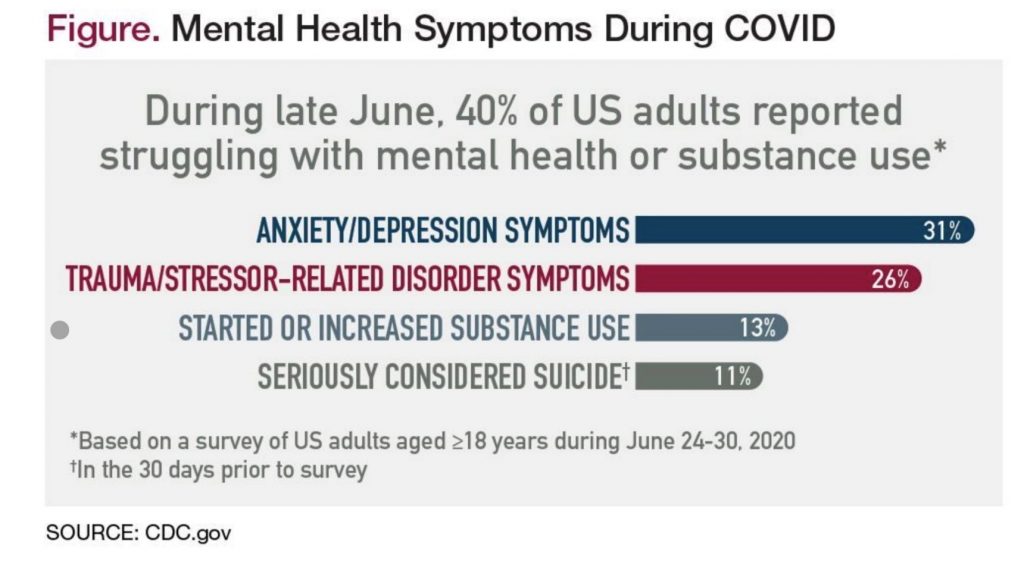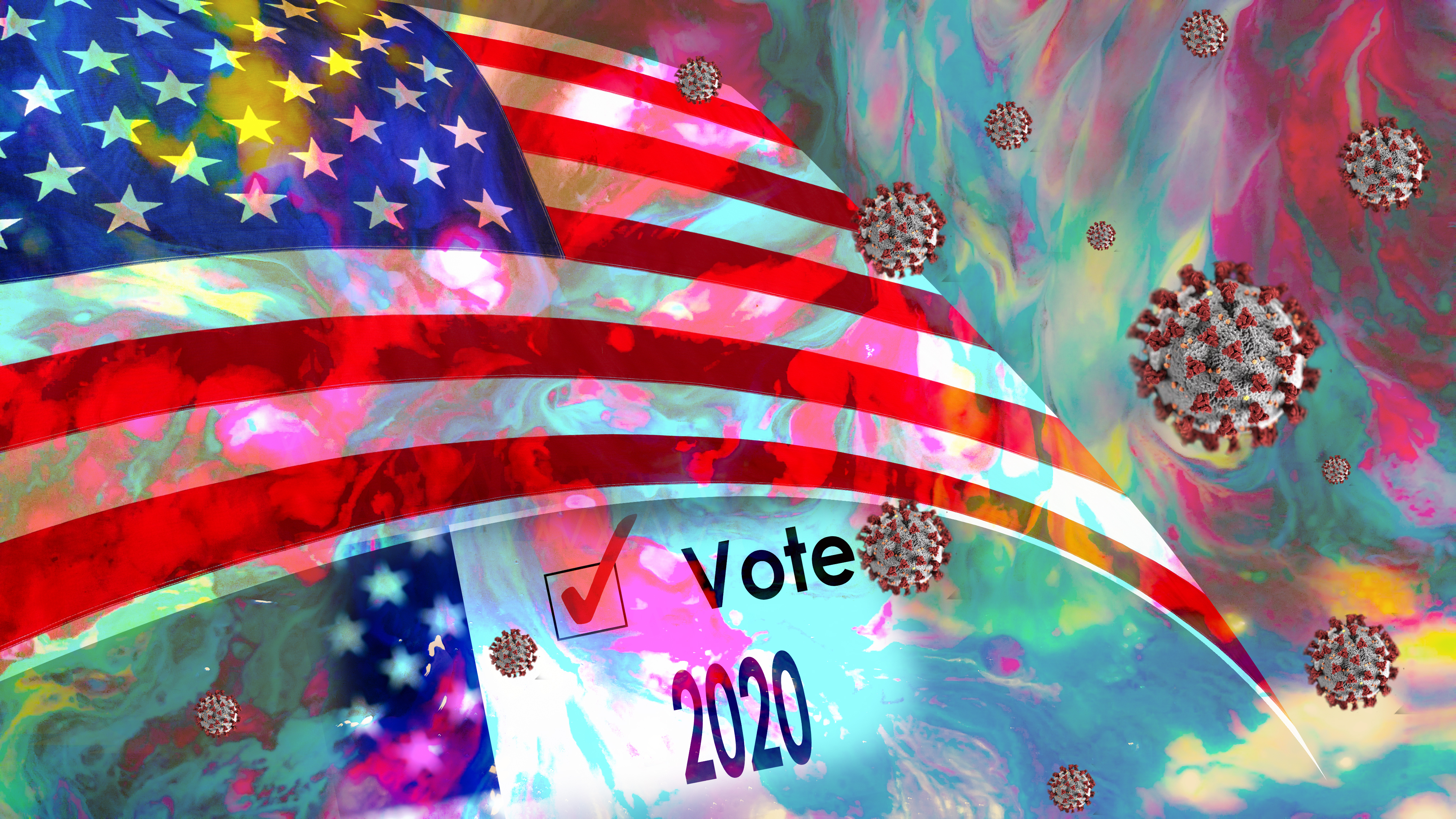UConn Today sat down with Karen Steinberg, Ph.D., psychologist at the Mood & Anxiety Clinic at UConn Health and associate professor of psychiatry at UConn School of Medicine, to find out what the Clinic’s team of counselors are hearing most from patients in regards to the pandemic-induced stress, and the additional uncertainty and anxiety regarding the outcome of the Nov. 3 U.S. Presidential election.
How would you describe the population of the United States right now when it comes to mental health or stress levels?
I don’t think anyone will be surprised to learn that we are definitely observing an uptick in mental health concerns over the past 7 months. We are seeing increased levels of depression and anxiety symptoms, increased alcohol and substance use and overdoses, and increased suicidality. The CDC reported on some of these findings several months ago in a screening survey they conducted at the end of June. We cannot necessarily say whether these reports of distress mean a large increase in diagnosed clinical syndromes; however, there appears to be greater demand for mental health services, and the sense that people are clearly struggling.
Here is a figure from the CDC:

Because of the COVID-19 pandemic, what types of concerns are patients mostly turning to you and mental health experts for?
People describe feeling fearful, worrying about their health and safety, and that of their loved ones. I have heard them describe mental exhaustion and a sense of powerlessness over what will happen in the future. Some aspects of stress that make it especially difficult is when someone feels they cannot predict its onset or occurrence, or they cannot control the outcome, or they cannot make it stop. The current pandemic has all of these elements. People also feel demoralized in not feeling as though they have a voice in the conversation about how the pandemic is being handled. People have described having difficulty with restrictions involving social distancing which are necessary to prevent or reduce transmission. They feel lonely and isolated in not being able to spend time with friends and family. Alternatively, sometimes people struggle with spending too much time with individuals they may have conflict with. They feel frustrated in not being able to plan their lives the way they used to, and not knowing what the future may hold.
On top of pandemic stress, are you seeing an uptick in patients wanting to talk about election anxiety, too?
Yes, definitely. Many of the people I speak with are very worried and concerned about the upcoming election. They have great fear about their candidate not winning and feel overwhelmed at the thought of the other candidate leading (or continuing to lead) the country. I can’t remember a time in my lifetime where the social and political divisions were this great, and where people had such intense feelings about the political climate as they do now. It was true after the last election as well. People discuss fears about our democracy being in jeopardy and not feeling secure in the knowledge that standard rules will be followed. They describe a tremendous sense of concern about the current state of our country, threats to the environment, and assaults on protections for individuals from diverse social, cultural and ethnic backgrounds, sexual orientations, and gender identities. They see this election as an opportunity to repair from these destructive impacts; however, they worry that the process itself may not be relied upon, and this produces a great deal of anxiety. It is particularly difficult when people are struggling with fears about their own safety and well-being, that of those around them, and mistrust in the larger systems that have been designed to protect them. It is the equivalent of a child who only has its parents to rely on for safety, security, and survival, and when these individuals prove dangerous and untrustworthy through abuse, neglect, or otherwise abdicating their role. It leaves the child with a basic epistemic mistrust, and ontological anxiety that is not soothed by the presence of a wise, benevolent, protector.
Whether Democrat, Republican, or independent – what guidance or tips should Americans keep top of mind on Election Night – and possibly for the future, should the results take longer than expected?
I would recommend people titrate, or regulate, their exposure to political information and news coverage if they are already feeling reactive over the election and its outcome. Many people I’ve spoken with, patients, colleagues, friends, family, find themselves feeling very upset and overwhelmed. They may think that by consuming vast amounts of news and political coverage, they will feel better and less anxious. It is important to stay informed. It does give us a greater sense of control by gaining knowledge and information. But when this information serves to increase our anger, fear, or despair, and there isn’t a clear outlet, or path we can take to improve the situation, it may serve to increase our sense of helplessness. There’s nothing else they can do about the election at this point. The die is cast. Once someone has voted, they might be well- served to focus on things they can do, for themselves and others. For example, they might take a break, go for a walk, practice meditation or self-reflection, watch something humorous, spend time or talk with someone they care about, read something non-political, have a nice meal, practice self-care, engage in creative pursuits. Creative activities can be very beneficial on many levels. If you have a hobby, craft, or artistic interest, not necessarily being a great painter, but something you enjoy, or might like to learn, this can be very helpful for mind, body, and spirit, and can actually transform negative emotional states. We know that when people do things that cultivate positive emotional states, this helps us access certain parts of the brain where we can be more creative in our approach to problems and challenges. And if someone feels a deep conviction about problems in our society, they always have the ability to become more involved in the political process. There’s a quote I love by Anne Frank: “How wonderful it is that nobody need wait a single moment before starting to improve the world.”
What if my candidate loses? Is it okay to cry over a political election, or to be angry — or even cast blame at family and friends with opposing political views?
I think it’s almost always good to be aware of one’s emotions, and to try to express these feelings, in constructive ways. This is an important and tricky area. Many people I’ve spoken with, myself included, may find themselves struggling with having either friends, family, or close colleagues with widely divergent political views. And many times, people may not have even realized previously that they were so far apart. However, I think this is one of the byproducts of the time we are living in right now. For some reason, it has served an agenda to heighten and intensify the divisions between people rather than to discover and cultivate the commonalities. I was recently listening to an interesting story about how our country may have fared worse with the pandemic because there are so many deep social divisions, compared to countries where there is greater social cohesion, a sense of solidarity, and more of a community approach to large societal problems, the sense of “we are all in this together” vs. “us and them.” That in those places, there has been a better response and outcome with the pandemic. I’ve been thinking there should be some support groups available for people who are stressed out over the fact that people they love look at the world so differently from how they do. It seems very common at this time. And people do feel angry and surprised and sad about being in such different places from some of their family or friends. I think social media does not help with these problems either, it tends to exacerbate these feelings, and there is a lot of room for misinterpretation and misunderstanding with electronic messaging. I think people may need to make choices about who they can talk with about these feelings and the timing of these discussions. I don’t know that right after the election is the best time to speak with someone who has a very different view. The strong emotions and likely reactivity may lead to escalations that could be problematic. Someone may say something they will later regret. It’s always better to save these potentially difficult conversations for when one has had a chance to process and digest these emotions.
What’s the best way to conduct myself or cope if my presidential candidate wins, or loses? And when do I know if I or a loved one may need professional mental health?
It’s an important question. Perhaps plan to spend some time during or after the election with people – and if you can’t in person, then on a call or virtual meeting – that are sympathetic and supportive of you and your feelings. Even if you don’t all feel the same way, at least you will be in the presence of people who have compassion for you. Which we all need.
In terms of when to seek help: There is a normal range of emotions and variability in moods throughout our days or weeks. It’s important to have resources and capacities to manage these varying states. I recommend people do all they can to build up a metaphorical shed or storehouse to contain both internal and external resources for managing the vicissitudes of daily life. And it’s important to recognize either when this toolkit is lacking or needs reinforcement, such as through professional help. Whenever we find ourselves overwhelmed with our current circumstances, not able to regain a sense of equilibrium after our usual routines and practices, seek out social support. Sometimes, nothing is working, and thoughts are causing one to travel down a kind of rabbit hole that seems impossible to ascend. Someone may notice this about themselves or a loved one. There should be no shame in asking for help or support. It takes courage and strength to do this and to recognize the need and the entitlement to such help. Unfortunately, in our society, we have this backwards notion about vulnerability and the need to be stoic and compulsively self-reliant. It’s very harmful. Much better to join the world of imperfect human beings and recognize our needs for support, understanding, and each other.
For further emotional wellbeing resources, visit this link.



